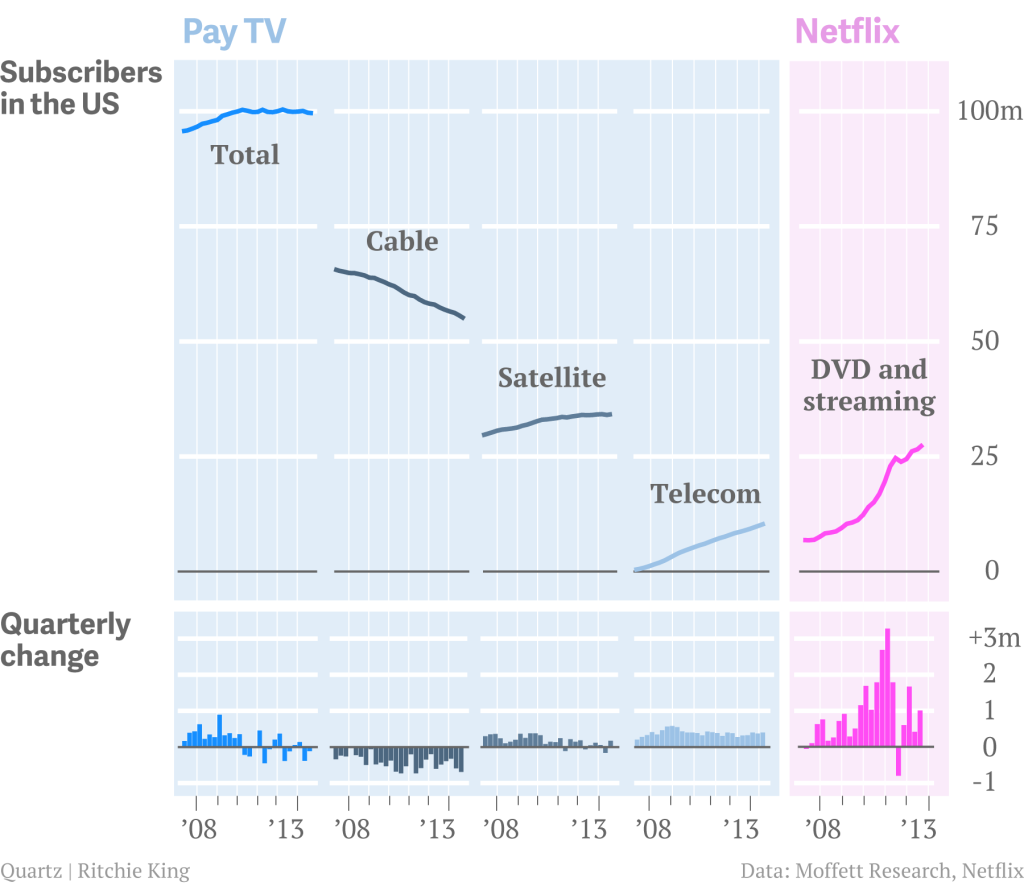Cable TV can't survive by jacking up prices forever
Time Warner alone lost over 300,000 customers last quarter


A free daily email with the biggest news stories of the day – and the best features from TheWeek.com
You are now subscribed
Your newsletter sign-up was successful
Cable TV is bleeding. People have been predicting the death of cable for years — The Week looked at four reasons the Time Warners and Comcasts of the world were headed toward extinction in 2010 — but the steady rise in cord-cutting keeps giving cable critics continuing cause to cheer.
Last quarter, according to media analyst Craig Moffett at MoffettNathanson, cable companies lost 687,000 customers. Time Warner lost about half of those cable-cutters (304,000 to be exact). The cable companies' big losses dragged down the whole pay-TV industry, more than canceling out gains in satellite TV and telephone-based video-streaming subscriptions (think AT&T U-verse).
All told, pay-TV companies lost 113,000 in the quarter. It wasn't the year's first net loss. "The pay-TV industry has reported its worst 12-month stretch ever," Moffett writes.
The Week
Escape your echo chamber. Get the facts behind the news, plus analysis from multiple perspectives.

Sign up for The Week's Free Newsletters
From our morning news briefing to a weekly Good News Newsletter, get the best of The Week delivered directly to your inbox.
From our morning news briefing to a weekly Good News Newsletter, get the best of The Week delivered directly to your inbox.
There are mitigating factors, sort of. TWC's big exodus came in the same period it was in a bruising grudge match with CBS over how much Time Warner has to pay CBS to rebroadcast the network. Also, the customer losses "could have been worse," says Peter Kafka at All Things D. Moffett notes that thanks to a stalled housing recovery, there were 366,000 fewer new housing units in the quarter than a year earlier.
That suggests, says Kafka, that "since pay-TV growth is usually tied to housing growth, you would would think that would mean pay-TV declines would be worse last quarter than they were a year ago. But they're not."
On top of that, pay-TV providers actually saw a 5.1 percent increase in revenue in the third quarter, thanks to "unending price increases," says Kafka. "If they can keep pulling that trick off, they're in fine shape."
But of course, they can't. In fact, "the fact that pay-TV revenue is still rising smartly is part of the problem," say Moffett and his partner, Michael Nathanson. "We have always argued that cord-cutting is an economic phenomenon, not a technological one," so people are fleeing to the internet for their video content because cable is just getting too expensive. "Rapidly rising prices are squeezing lower-income consumers out of the ecosystem."
A free daily email with the biggest news stories of the day – and the best features from TheWeek.com
The cable companies can't continue like this, says Mark Sullivan at TechHive. It's not all their fault: "One of the biggest reasons for the subscriber losses is quickly-rising licensing prices being asked by TV network and Hollywood content creator/owners," estimated at "a brutal 8-10 percent per year." Still, as video content becomes less profitable, the cable companies are making up for the shrinking margins by raising internet rates, too. This could easily become a vicious cycle of price hikes and fleeing customers, Sullivan says.
As prices rise, and Netflix, Hulu, and Amazon continue to improve their offerings, the cord cutting option will begin to look like the best option for more and more people. To be clear, today's subscriber loss numbers aren't yet big enough to represent grave material losses to the pay TV companies.... But if the loss numbers of the past four quarters are the beginning of a long upward line, they could be pointing at day in the near future where quarterly subscriber losses are in the millions. [TechHive]
Quartz's Richie King put together this chart that, among other things, contrasts the downward trajectory of cable with the sharp upswing at Netflix:

(Source: Quartz)
It could continue to be a steady bleed for cable providers, or they could start hemorrhaging customers even more quickly. But if their only tool is raising prices, eventually even stalwart cable junkies will start considering a cord-free life. Twenty years ago, who would've predicted the demise of video-store giant Blockbuster?
Peter has worked as a news and culture writer and editor at The Week since the site's launch in 2008. He covers politics, world affairs, religion and cultural currents. His journalism career began as a copy editor at a financial newswire and has included editorial positions at The New York Times Magazine, Facts on File, and Oregon State University.
-
 How the FCC’s ‘equal time’ rule works
How the FCC’s ‘equal time’ rule worksIn the Spotlight The law is at the heart of the Colbert-CBS conflict
-
 What is the endgame in the DHS shutdown?
What is the endgame in the DHS shutdown?Today’s Big Question Democrats want to rein in ICE’s immigration crackdown
-
 ‘Poor time management isn’t just an inconvenience’
‘Poor time management isn’t just an inconvenience’Instant Opinion Opinion, comment and editorials of the day
